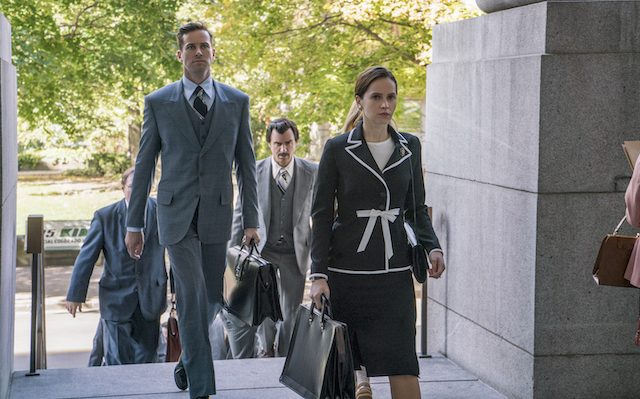
The documentary “RBG” gives a fine overview of the life and work of Supreme Court justice Ruth Bader Ginsburg, but the fictionalized version, “On the Basis of Sex,” isn’t entirely redundant. Directed by Mimi Leder (“Deep Impact,” “Pay It Forward”) from a screenplay by Daniel Stiepleman (RBG’s nephew), it focuses mainly on a particular stretch in the 1970s when Ginsburg and her husband, Martin, worked on a landmark gender-discrimination case. This was a time when many people, even legal professionals, had never thought of “gender discrimination” as being a thing, so pretty much any case was going to be groundbreaking.
The first part of the film provides context, with young Ruth (Felicity Jones) meeting Martin (Armie Hammer) in 1956 at Harvard, where she’s one of nine female students in the law school. They have a happy, complementary marriage — he’s gregarious and funny; she’s, uh, not great at tact — and work as equal partners in the home (she’s a terrible cook). Despite graduating at the top of her class (from Columbia; she transferred when Marty got a job in New York), Ruth can’t find any law firm that will hire her, so she becomes a professor at Rutgers while maintaining her license to practice law.
That comes in handy when she stumbles across a sex-discrimination case that she figures is bound to get attention because the victim is a man — Charles Moritz (Chris Mulkey), a bachelor who’s been told by the IRS that he can’t deduct the cost of an in-home nurse to help care for his ailing mother because that deduction is only available to women or widowed men. That obviously makes no sense, but the U.S. attorneys (played by Sam Waterston, Stephen Root, and Jack Reynor) defending the law hysterically claim that changing it will be a slippery slope that leads to the downfall of society, etc. Even the ACLU, represented by Mel Wulf (Justin Theroux), doesn’t want to tackle sex discrimination when racism still hasn’t been fixed. Ruth’s feminist idol, activist Dorothy Kenyon (Kathy Bates), advises her to “change minds first, then laws.” The legal argument that Ruth and Martin land on is that minds already have changed; the law just needs to catch up.
Though Ruth Bader Ginsburg is a liberal hero (see “RBG” if you want more hagiography), the “politics” of this film are pretty moderate — which goes to show how much we’ve changed since the ’70s, when her ideas were controversial. The film is slightly above-average for a historical drama, with compelling legal maneuverings at its core, and while Jones and Hammer’s portrayals of Ruth and Marty aren’t physically or vocally accurate, they’re good performances that give the characters some depth. In particular, I like Ruth’s relationship with liberated teen daughter Jane (Cailee Spaeny), who comes to appreciate that debating and sharing ideas is how her mother expresses love — a key to understanding a famously icy icon.
B (2 hrs.; )





